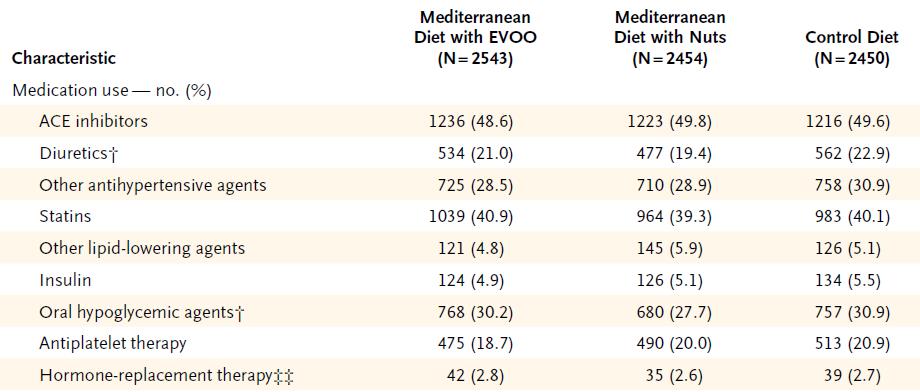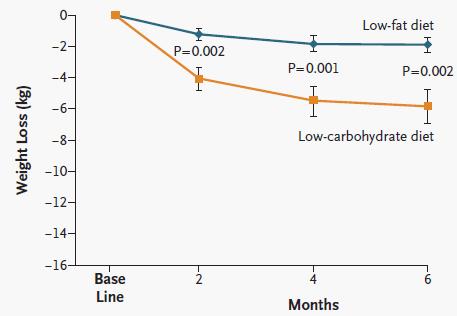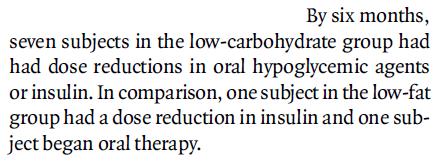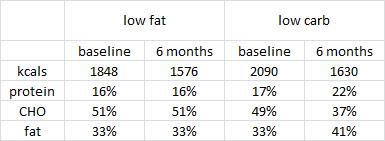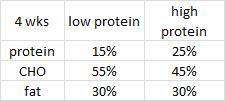Whether you’re strictly adhering to a diet or just doing your own thing, if year after year your GP is prescribing more and more medications to stave off morbidity and keep you intact, then the diet you’re following is most likely Fail. The same is true if your body weight is creeping upward or your quality of life is creeping downward.
The glaring Fail of all 3 diets in the recent Mediterranean Diet Study for the medications criteria threw up a huge red flag. As a brief refresher, at baseline and 5 years later, prescription medication usage was as follows:
and at follow-up:
In other words:
This study included two Mediterranean diets and a low fat control diet, none of which markedly differed from a normal diet in terms of macronutrient ratios –
So, changing foods while keeping macronutrients the same didn’t work. This is like switching from white bread to whole wheat bread. Or switching from pork to chicken. It didn’t work, because medication use increased (that’s how I’m defining what “works”).
What else could Estruch and colleagues have tried?
With regard to the rise in insulin and antidiabetic drug use.
From the notorious Samaha study, which produced this stunning visual:
But that’s not the point of this post. It’s This:
So the low carb stopped taking their antidiabetic medication. Their glucose metabolism must’ve down the toilet. Or not:
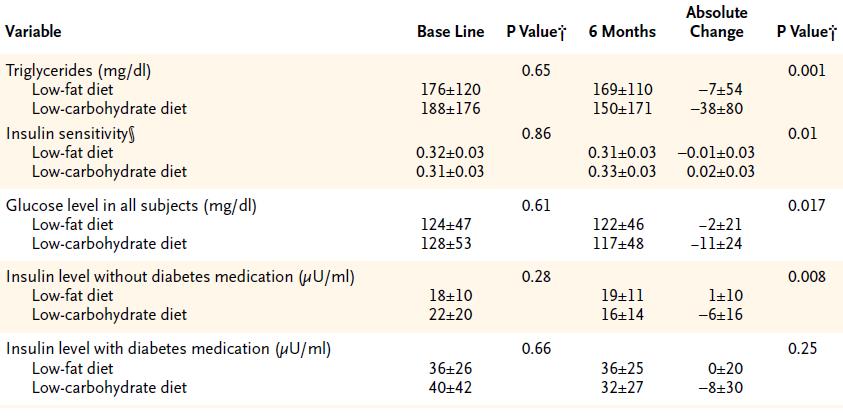
Switching from white bread to organic whole wheat bread didn’t do the trick for Estruch, but switching from white bread to low carb did (for Samaha). They went off glucose-lowering medications but blood glucose levels went down. Go figure.
Is this an isolated finding? Unfortunately [for some], not. In the soon-to-be-notorious weight loss by Hussain, obese participants in the low carb group:
Yet their glucose levels still declined, while body weight plummeted: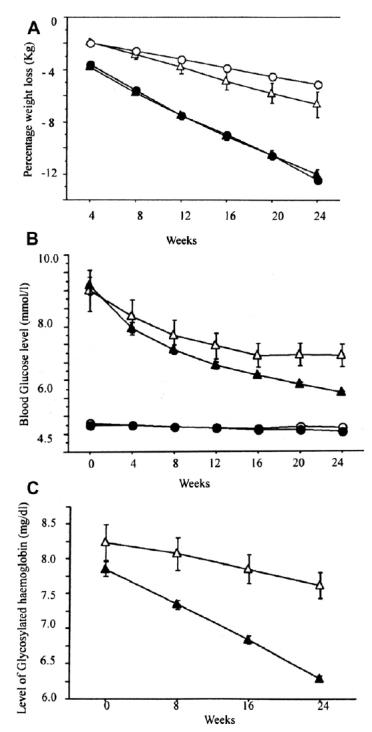
It’s difficult to find studies which assess medication usage patterns AND diet at both baseline and follow-up. But given what we’ve got so far, switching from white bread to organic multi-grain bread doesn’t do a whole lot. When it comes to the rise in use of insulin and antidiabetic medications in Estruch’s Mediterranean dieters, data from Samaha and Hussain suggest a lower carbohydrate higher fat diet would’ve prevented this.
With regard to antihypertensive medications.
Teunissen-Beekman compared the effects of dietary protein on blood pressure in moderately hypertensive subjects for 4 weeks and found the following (A, systolic; B, diastolic):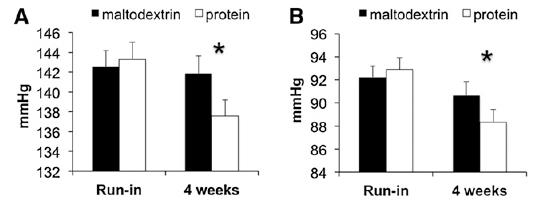
And from the very well-designed OmniHeart study, subjects assigned to either high protein or high fat both fared better than those assigned to a high carb diet.
This.
Because of This.
Collectively, data from Teunissen-Beekman & Appel suggest a higher protein, higher fat, and lower carb diet might’ve prevented the rise in antihypertensive medication use seen in Estruch’s Mediterranean and low fat dieters.
With regard to anti-platelet therapy.
EPA/DHA, fatty fish (eg, salmon), and red wine? (Allman-Farinelli et al., 2005)
Low GI diet*? (Brand-Miller et al., 2009) (*the easiest and most effective way to low GI is low carb high fat)
High protein? (Rizkalla et al., 2012)
in other words: anything other than what Estruch did.
Confounding variables.
Is it possible that the generally poor overall health of the subjects in Estruch’s study led to their increased requirement for prescription medications – regardless of diet? Of course [I say begrudgingly]. But the diets they were assigned to were very similar, in terms of macronutrients, to the diets that contributed to their generally poor overall health to begin with. And the diets used by Samaha, Hussain, Teunissen-Beekman, Appel, etc., etc., were very, very different (in terms of macronutrient composition.)
A Mediterranean diet is probably “healthy” for healthy people. The same can be said for a low fat diet – healthy women in the WHI didn’t fare any worse when they reduced their fat intake. But those with pre-existing heart conditions at baseline went downhill when they actively tried to lower their consumption of dietary fat. IOW the insult incurred by a low fat diet may be too small to affect healthy people; but it does no favors for and may actually harm susceptible people and those with pre-existing heart conditions.
IMHO, it just seems like tweaking the types of foods while keeping macronutrients the same is like whacking a big block of ice with a wiffle-ball bat, whereas drastically altering macro’s is like smashing it with a sledge hammer.
just sayin’
If you like what I do and want to support it, consider becoming a Patron! Five bucks a month for full access and there are many other options. It’s ad-free and you can cancel if it sucks ????
Also, I’m open to suggestions so feel free to leave a comment or email me directly at drlagakos@gmail.com.
Affiliate discounts: if you’re still looking for a pair of hot blue blockers, Carbonshade is offering 15% off with the coupon code LAGAKOS and Spectra479 is offering 15% off HERE. TrueDark is running a pretty big sale HERE. If you have no idea what I’m talking about, read this then this.
20% off some delish stocks and broths from Kettle and Fire HERE.
If you want the benefits of ‘shrooms but don’t like eating them, Real Mushrooms makes great extracts. 10% off with coupon code LAGAKOS. I recommend Lion’s Mane for the brain and Reishi for everything else.

